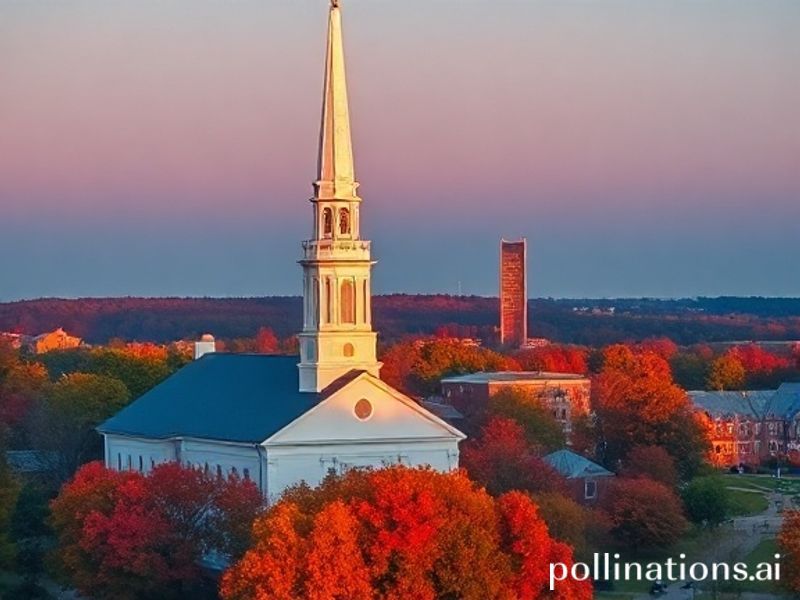How a Quiet Campus in Massachusetts Is Quietly Reshaping the World—One Parking Ticket at a Time
In the grand geopolitical chessboard, where Beijing buys ports like children collect trading cards and Silicon Valley titans trade privacy for market share, one must look to Amherst, Massachusetts, to understand how the empire really sustains itself—through parking tickets, artisanal ramen, and a quiet, almost British refusal to acknowledge anything unpleasant. The University of Massachusetts Amherst, affectionately dubbed “UMass” by people who enjoy saving syllables almost as much as they enjoy saving money, sits 90 miles west of Boston like a polite neutron star: enormous gravitational pull, negligible street cred.
To the average Parisian café philosopher or Singaporean futures trader, the name evokes little beyond a vague sense of New England foliage and the suspicion that someone, somewhere, is majoring in “Sustainable Craft-Beverage Marketing.” Yet this 32,000-student flagship is quietly terraforming the global future in ways that would make Davos blush. Consider the campus’s 1,450-acre experiment in controlled chaos: a living laboratory where students from 75 nations come to study microbiology, puppetry, and the exact angle at which a riot-gear-clad police officer will pepper-spray a sophomore documenting said officer on TikTok. The resulting footage, naturally, trends in Mumbai minutes later—soft power by way of meme.
Internationally, UMass functions as a sort of benevolent parasitic wasp: it stings you with tuition bills, implants an academic larva, then releases you back into your homeland to build biotech startups or, if the market gods are fickle, artisanal oat-milk cooperatives. The university’s alumni network stretches from the glassy towers of Dubai to the corrugated-iron labs of Nairobi, each node humming with the same fluorescent optimism that once powered late-night debates over whether Kraft mac ’n’ cheese qualifies as a food group. In Lagos traffic, a civil engineer trained in Amherst calculates bridge loads while humming the fight song; in Seoul, a polymer chemist remembers the exact flavor of a dining-hall burrito that cost less than the bullet train to Busan. These memories, small yet stubborn, colonize the mind more effectively than any IMF loan conditionality.
Meanwhile, the campus itself has become a testing ground for late-stage capitalism’s more whimsical contradictions. A new $225 million life-science building rises like a glass middle finger to the humanities, its atrium festooned with living moss walls that require more maintenance than a Swiss bank account. Across the quad, the campus store sells fair-trade hoodies stitched in the same Bangladeshi factories that supply every other institution promising to “disrupt the supply chain.” The cognitive dissonance is so thick you could spread it on locally sourced sourdough.
Climate change, that slow-motion asteroid, gets the full UMass treatment: a 100% renewable-energy pledge by 2032, solar farms disguised as cow pastures, and a student body that flies home to Jakarta on Emirates with the carbon footprint of a small Balkan nation. The irony is not lost on the faculty, who publish peer-reviewed papers on sustainability between conferences in Barcelona and Boulder. “We offset,” they mutter, swiping corporate AmEx cards with the resigned grace of medieval indulgence peddlers.
Yet for all the gentle mockery, the place works. Its polymer researchers just patented a biodegradable plastic that could finally rid the Ganges of its glittering polymer turds. Its public-health grads are vaccinating infants in rural Peru via drones that once delivered burritos to stoned undergraduates. Somewhere in a basement lab, a PhD candidate is tweaking algae to sequester carbon faster than a Swiss banker can sequester rubles. The world, bloated on cynicism, still needs earnest nerds who believe equations can atone for our sins.
So when the next global crisis rolls in—be it viral, financial, or merely existential—watch for the quiet alumni in the back of the Zoom room, the ones with the UMass Zoom backgrounds that look suspiciously like stock photos of autumn leaves. They will, with maddening politeness, suggest a data-driven solution involving Bayesian modeling and a modest carbon tax. The rest of us will roll our eyes, hit mute, and secretly hope they’re right. After all, someone has to keep the lights on in the asylum; might as well be the kids who once pulled all-nighters fueled by Dunkin’ and dread.







